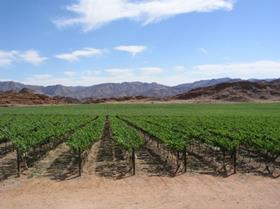
South African grape growers are feeling the effect of the drought and heat experienced so far this summer, conditions that have resulted in a estimated loss of between 5-6m cartons from the first seasonal estimate of between 61.3m cartons and 63.2m.
The impact of the heat and the resultant drop in export volume is being felt across the country, with only the northern regions exporting a slightly higher crop.
Industry body SATI said that the ongoing warm and dry conditions continued to affect the 2015/16 table grape harvest.
“This final crop estimate confirms further reductions in the overall crop size [of the export crop] as the Olifants River, Berg River and Hex River regions are following the same trend as the Orange River Valley in terms of smaller berry size and bunch weights at harvest.'
SATI noted that the new estimate was adjusted due to the export crops from the Olifants River, Berg River and Hex River regions falling by 8.6 per cent, 2.7 per cent and 5.3 per cent respectively.
Growers in the late areas have said that they expect the season to end earlier than last year. In the Northern regions the dry season has, ironically, benefited growers, because it is a rainfall region that is normally at risk during the summer. The area exported 4.7m cartons compared with the pre-season estimate of 4.5m.
In the Orange River the final export crop reached 18.5m cartons compared with an estimate of just over 20m cartons. Apart from the effect of the heat, growers in the Orange River were also lucky to escape widespread damage from heavy rains and floods which hit the area as the last grapes were being packed – although the rain caused a huge amount of damage to the raisin crop.
The heat and drought in the Cape regions are causing concern for stonefruit and apple and pear growers, as well as citrus growers in the Olifants River Valley.
Growers from Ceres, which is now moving into mid-season harvesting, report that in some cases they are running out of water for irrigation. This could affect the late season varieties because harvesting normally runs through to the end of April.



